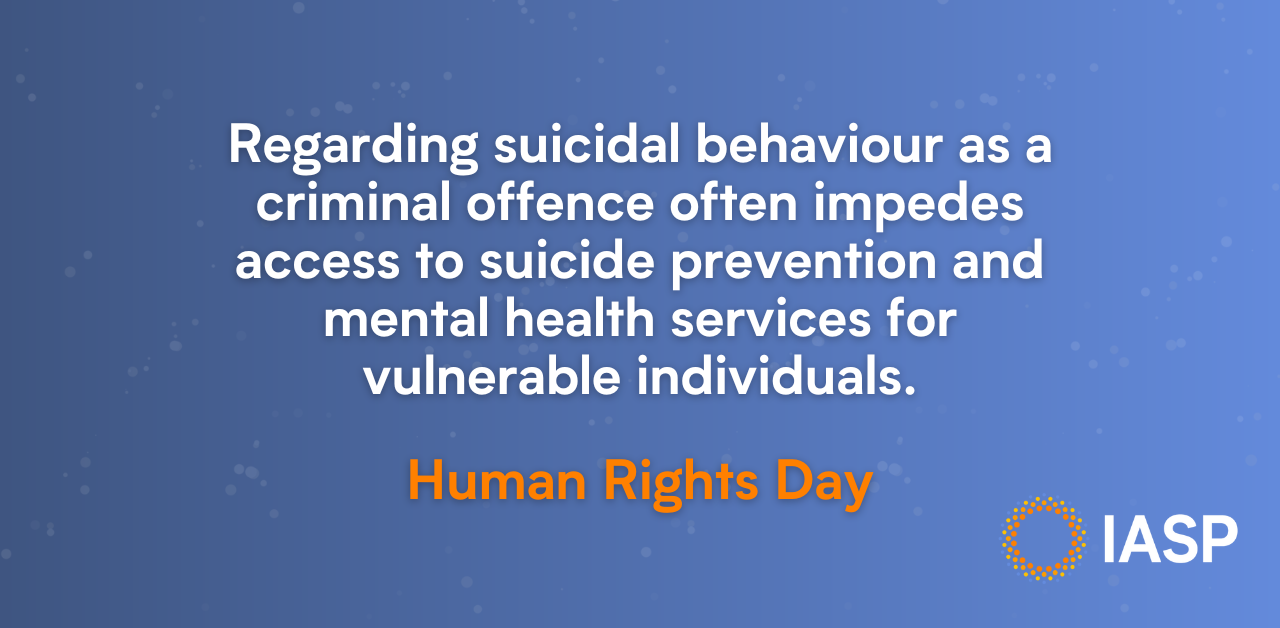This year marks the 75th anniversary of the Universal Declaration of Human Rights adopted in 1948 by the United Nations General Assembly. Human Rights Day began that year as a way of commemorating the historical document, which set out some of the fundamental human rights, such as the right to life, social security, health, and education. This day reminds us of the importance of fostering supportive environments and the need to champion human dignity through our efforts.
uman Rights Day provides the opportunity to spotlight the urgent need for comprehensive mental health and suicide prevention services as a fundamental human right. The World Health Organisation (WHO) estimates that 75% of people affected by mental and neurological disorders in low- and middle-income countries do not get the treatment they need. Mental health and suicide remain topics surrounded by stigma and discrimination in many parts of the world. This, coupled with the lack of infrastructure and inaccessible services, contributes to the burden of disease and the subsequent treatment gap. Suicide remains a global health crisis that requires urgent attention from policymakers. Thus, there is a need to focus on mental health and suicide prevention from a human rights perspective and advocate for its integration within primary health care services.
The stigma and discrimination around mental health and suicide also hinder people from seeking the help they need. This is a direct violation of human rights because the Universal Declaration of Human Rights mentions the “right of everyone to the enjoyment of the highest attainable standard of physical and mental health”. Criminalising suicide exacerbates the stigma surrounding suicide and hinders help-seeking behaviour. Regarding suicidal behaviour as a criminal offence often impedes access to suicide prevention and mental health services for vulnerable individuals. The WHO Comprehensive Mental Health Action Plan 2013-2030 recommends and recognises decriminalisation as an important step toward building systems to prevent, diagnose, and treat mental health conditions. Decriminalisation leads the way for legal and policy environments that acknowledge the autonomy, agency, and dignity of individuals experiencing mental health distress.
The human right to health can be protected by implementing a public health approach that allows vulnerable people to receive adequate mental health care and assistance during times of need without the fear of legal repercussions. Decriminalisation of suicide is a major stepping stone towards supporting the right to access care because it does not merely act as a legal reform. But instead, it serves as the recognition that individuals in distress need support instead of punishment. Support workers can respond differently when laws change because public administration, which includes crises and social support services, also changes with them. Additionally, it fosters an atmosphere of open communication by removing obstacles to discussing something against the law. Therefore, decriminalisation sends a powerful message that society is dedicated to encouraging understanding, compassion, and promoting comprehensive mental health support.
Accessible and affordable mental health services, supportive environments, crisis interventions, and policies and programs that recognise the autonomy and dignity of individuals are imperative to realise the 2023 theme “Freedom, Equality and Justice for All”. We call on world leaders, mental health professionals, and communities to unite in implementing and strengthening mental health and suicide prevention services globally, as an integral part of upholding human rights.




